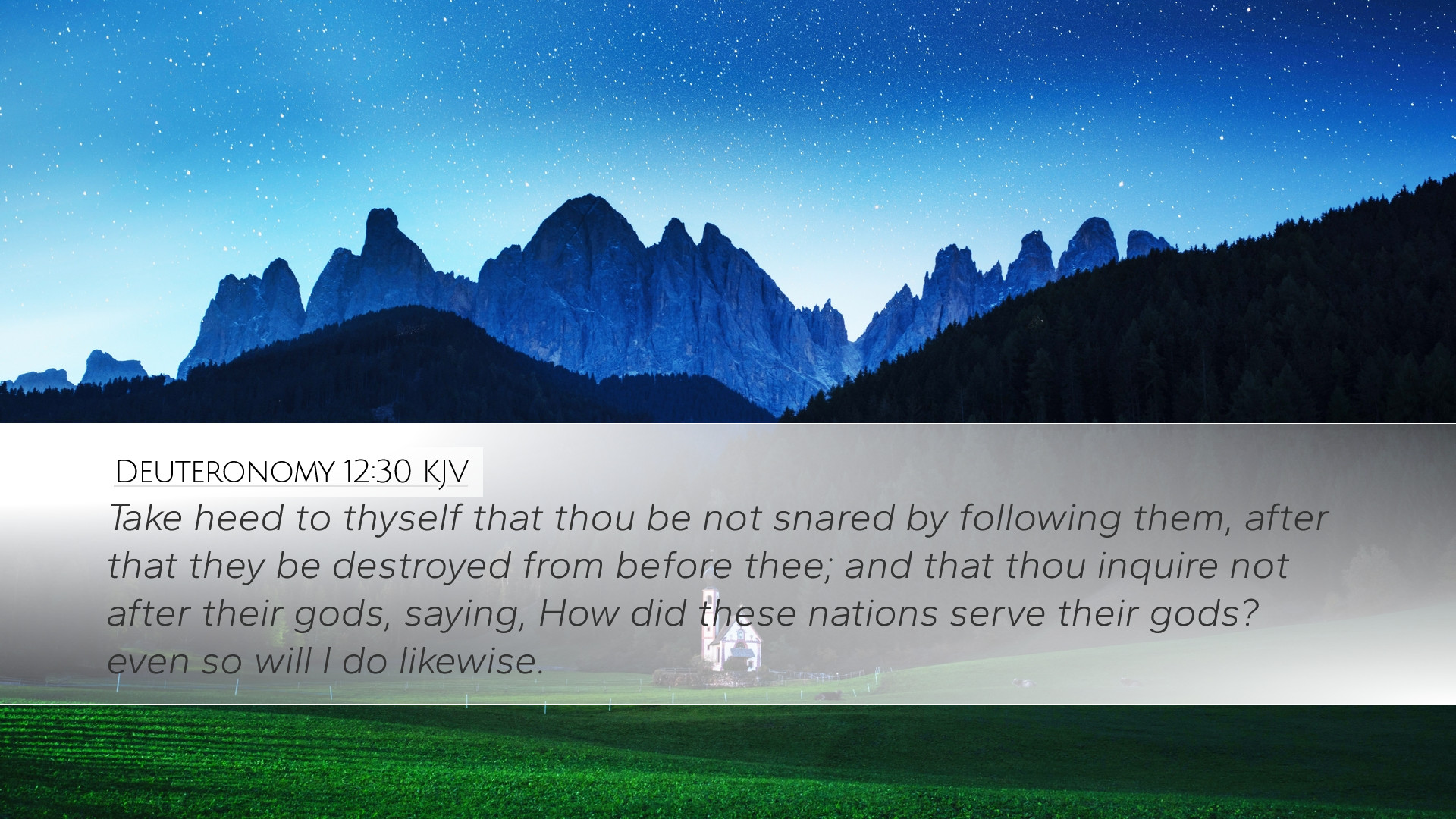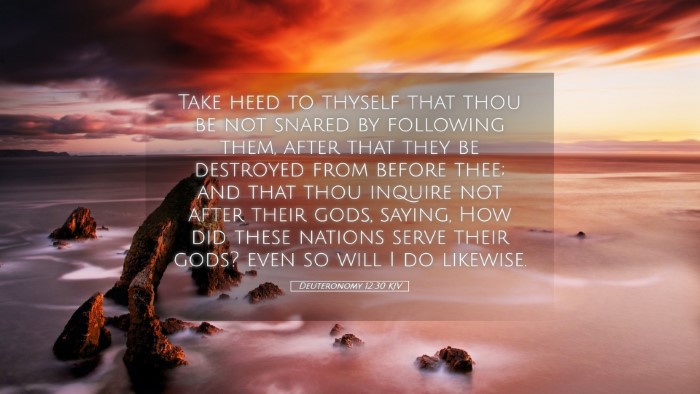Commentary on Deuteronomy 12:30
Verse Text: "Take heed to yourself that you be not snared by following them, after that they be destroyed from before you; and that you inquire not after their gods, saying, How did these nations serve their gods? even so will I do likewise."
Introduction
The verse Deuteronomy 12:30 serves as an admonitory passage within the broader context of God's instructions to Israel regarding the land they are about to inherit. This verse warns the Israelites to remain vigilant against the practices and customs of the nations they would encounter, emphasizing the importance of fidelity to God and the unique covenant they share with Him. Noteworthy biblical commentators such as Matthew Henry, Albert Barnes, and Adam Clarke provide profound insights into this verse, highlighting themes of spiritual caution and the necessity of a distinct identity for God's people.
Exegesis and Insights
Context and Background
Matthew Henry's Commentary: Henry observes that this passage is part of Moses' farewell addresses, addressing a people on the verge of entering Canaan. The imperative to "take heed" emphasizes personal responsibility in maintaining faithfulness to God's commands. The caution against "being snared" denotes the danger of adopting foreign practices that could lead to spiritual ruin.
Albert Barnes' Notes: Barnes notes that this caution is rooted in Israel's covenant relationship with God. The phrase "following them" points to the grave danger of assimilating into the surrounding cultures and adopting their idolatrous practices. This command also serves as a reminder that Israel's identity is bound in worshiping Yahweh alone.
Adam Clarke's Commentary: Clarke elaborates that the Israelites were prone to curiosity about other nations' worship methods. His commentary suggests that the text warns against the temptation to explore and imitate, which reflects a lack of trust in God's ways and a desire for worldly validation. Such inclinations could dilute their commitment to Yahweh, leading to destructive outcomes.
The Danger of Syncretism
The central theme in this verse is the danger of syncretism—blending spiritual beliefs and practices from different religious systems. This concern is not merely about idolatry but highlights the risks associated with a diluted faith.
- Cultural Influence: The surrounding nations represented a constant threat of cultural and spiritual influence. The Israelites are directed to remain aloof from such practices to safeguard their relationship with God.
- Spiritual Compromise: The temptation to inquire about and emulate the rituals of surrounding nations suggests a propensity for spiritual compromise, which is detrimental to their covenantal integrity.
- God’s Exclusive Claim: The warning emphasizes that God’s people are called to worship Him exclusively, implying that any deviation invites judgment and destruction.
The Role of Inquiry
The latter part of the verse highlights the act of inquiry—asking, “How did these nations serve their gods?” This inquiry is not inherently wrong; however, the intent behind the inquiry is crucial. The question arises from a curiosity that can lead to imitation rather than discernment.
- Intent Matters: The caution suggests that curiosity must be checked against God’s commands. The pursuit of understanding should not lead to compromise of faith.
- Discernment over Imitation: The focus should be on understanding God’s ways rather than imitating those who do not worship Him, which ensures spiritual purity.
Implications for the Church Today
This verse's implications resonate with contemporary issues faced by the Church. The principles derived from Deuteronomy 12:30 inform modern believers about the challenges posed by cultural trends and societal norms that may conflict with biblical teachings.
- Guarding Against Cultural Temptations: Just as Israel was warned, the present-day Church must remain vigilant against cultural influences that threaten to alter its identity and commitment to Christ.
- Understanding Spiritual Identity: It is imperative for Christians to understand their identity as a holy people set apart for God, echoing the sentiments of 1 Peter 2:9.
- Engagement vs. Isolation: The challenge for believers today lies in balancing engagement with the world while maintaining distinctiveness in worship and ethical living.
Conclusion
Deuteronomy 12:30 is a powerful exhortation to vigilance and faithfulness. The admonition to avoid the influences of surrounding nations reiterates the necessity of a profound commitment to God and His ways. As highlighted by Matthew Henry, Albert Barnes, and Adam Clarke, the lessons drawn from this verse transcend time. They warn against the allure of syncretism and remind believers that true worship must stem from an exclusive devotion to the one true God. In teaching and applying these truths, pastors, students, theologians, and scholars can help foster a community that remains true to its spiritual calling amidst a complex and often conflicting world.


